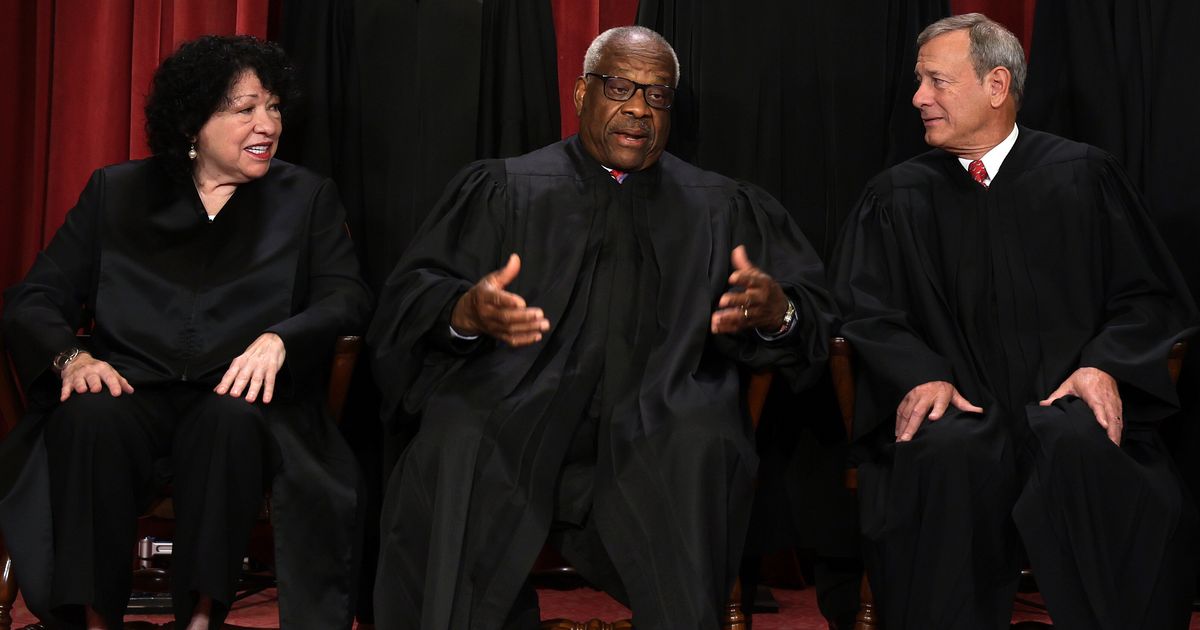As the Supreme Court prepares to hear two cases that could decide the future of the internet, the usual partisan divide doesn’t seem to apply.
Look no further than 27 attorneys general – Republicans and Democrats of States big and small, including California, Texas, Rhode Island and Alaska – which together urge the court restrict the scope Section 230or what some have called “the twenty-six words that created the Internet”.
The 1990s law protects websites from liability based on their users’ posts. For example, while an individual author can be sued for a defamatory blog post, the platform on which the text appears cannot.
Notably, lower courts have interpreted the law’s protections to cover recommendation algorithms as well. In Gonzalez vs. Google, which the Supreme Court will hear on Tuesday, the petitioners – family members of an American who died in the 2015 Paris terror attacks – dispute that interpretation, arguing that YouTube’s recommendation algorithm helped recruiting for the Self-proclaimed Islamic State and therefore should not be immune from prosecution. Twitter against Taamneh, a similar case scheduled for oral argument on Wednesday, also concerns the liability of technology companies in terms of terrorism.
The 27 attorneys general seek to limit Section 230 protections. Social media sites, they writing in an amicus brief, don’t just provide content platforms; they “exploit” it to make money using sophisticated algorithms. When Americans are harmed by criminal content pushed by these algorithms, they should have the right to sue the platforms in state courts, the attorneys general argued.
This is where the bipartisan agreement ends. For every proponent of Section 230 restrictions — and for every proponent of a broad interpretation on the other side of the debate — there seems to be a unique motivation.
In New York, for example, Attorney General Letitia James’ (D) office said websites should lose Section 230 protections if they don’t take steps to prevent users from encouraging or planning acts of violence.
In Texas and Florida, after Republicans passed bills banning political discrimination by social media giants, they quickly faced lawsuits from the tech industry that cite Section 230 (and the first amendment).
A similar lawsuit was filed in California after the state passed a bipartisan bill setting rules for websites “likely to be viewed by children”. Attorney General Rob Bonta (D), in a press release on the Section 230 case, noted the investigations he has conducted into the treatment of minors by social media companies.
‘Killing people’
In other amicus briefs for the Gonzalez case, scholars and activists on both sides argue for a striking variety of causes.
The Anti-Defamation League said Section 230 should not automatically shield platforms from liability if they amplify hate and extremism. A brief from the Cyber Civil Rights Initiative referenced the case of a massive impersonation scheme by a man’s ex-boyfriend on Grindr, in which the victim’s lawsuit against the dating app has been blocked by Section 230. The National Center on Sexual Exploitation and other groups have pointed out that the law has been used to protect websites from lawsuits related to their hosting of images of child sexual abuse.
Notably, President Joe Biden and his predecessor Donald Trump have voiced their opposition to Section 230 — but for very different reasons.
During his 2020 campaign, Biden declared his opposition to the law after a New York Times writer asked about a Facebook ad accusing him of Ukraine-related corruption. And in 2021 he raged that social media platforms were ‘killing people’ with COVID-19 misinformation – a remark followed by a spokesperson’s announcement that the White House was ‘reviewing’ Section 230. In a Gonzalez brief, the Biden administration argued that Section 230 does not protect against lawsuits based on the design and implementation of “targeted recommendation algorithms.”
Trump, for his part, began speaking out against the law after Twitter began verifying his lies about mail-in voting.
To be clear, Section 230 does not exactly apply to Trump’s rebukes. For now at least, the First Amendment protects the ability of sites to vet, censor, or ban anyone they want, regardless of Section 230.
But some Tories, echoing their leader, said the supposed bias in content moderation should spell the end of the law’s protections. For the Gonzalez case, a group of Republican lawmakers led by Sen. Ted Cruz (R-Texas) argued that Section 230 immunity for “good faith” content moderation does not extend to “the removal or restriction of content due to user policy”, nor to “remove content that any user of Eggshell Psyche might possibly find offensive”.
“Freedom of expression would be seriously compromised”
Sure, Section 230 has plenty of supporters among tech giants and trade associations, but Meta and Google aren’t the only voices in the law’s corner.
Consider Wikimedia, the not-for-profit parent organization of Wikipedia, which told the High Court that without the current Section 230 protections, the lawsuits “would deplete the Wikimedia Foundation’s annual global litigation budget.”
Reddit, in its own submission, noted that Section 230 granted immunity to a volunteer moderator in the site’s r/Screenwriting community from a lawsuit brought by the disgruntled operator of a screenwriting contest, that of other users had accused of being a scammer. In its own brief, Yelp argued that “without immunity, misleading reviews would thrive and consumers would be harmed.”
“Without immunity, misleading reviews would flourish and consumers would be harmed.”
– Amicus brief from Yelp in favor of Google
Various civil liberties groups and think tanks, including the American Civil Liberties Union, Cato Institute And Reason Foundation, supported the law as currently interpreted. And in a joint memory led by the Electronic Frontier Foundation, various library groups and the non-profit Internet Archive have said Section 230 is essential protection.
‘Internet users’ freedom of expression would be seriously impaired’ if Section 230 protections were removed from web recommendations and other basic tools, the groups said, arguing it was the digital equivalent newspaper editors’ choices of layout, photographs and font sizes.
“A backbone of online business”
Other groups, including Bipartisan Policy Center and the Progressive Policy Institute, urged the court to let Congress change the law if it chooses, rather than drastically alter the interpretation in a ruling. And some legal scholars have called for the law to be changed to take into account “reasonable” efforts by websites to prevent illegal behavior. Several members of Congress have Already written their own reforms.
Section 230 has already been amended by a law known as FOSTA, or the Empowering States and Victims to Combat Online Sex Trafficking Act. Trump signed into law FOSTA in 2018, eliminating Section 230 protections for sites that facilitate prostitution and sex trafficking. Some sex workers criticized the movement to spell the death of safe online platforms for their work.
In the Senate, FOSTA received only two “no” votes – of Meaning. Rand Paul (R-Ky.) and Ron Wyden (D-Ore), who was one of two authors of the original Section 230 when he served in the House with the then-Rep. Chris Cox (R-California).
Both Wyden and Cox have expressed reservations about the impact of their legislation. “The original purpose of this law was to help clean up the internet, not to help people do bad things on the internet,” Cox told NPR in 2018. And Wyden, speaking to The New York Times one year later, recalled a comment he made at a conference of tech workers, referring to the “sword” of moderation and the “shield” of liability protection. “[If] you don’t use the sword, there will be people coming for your shield,” he said.
Yet Wyden and Cox wrote their own memoir for the Gonzalez case, speaking out in favor of Google and against a limited view of the law they drafted. The explosion of the internet since the passage of section 230 was proof in itself of the usefulness of the law, they wrote.
“The real-time transmission of user-generated content that Section 230 promotes has become the backbone of online activity, upon which countless internet users and platforms rely,” the brief reads. “Given the enormous volume of content created by Internet users today, the protection of Section 230 is even more important today than when the law was enacted.”
huffpost
Don’t miss interesting posts on Famousbio










